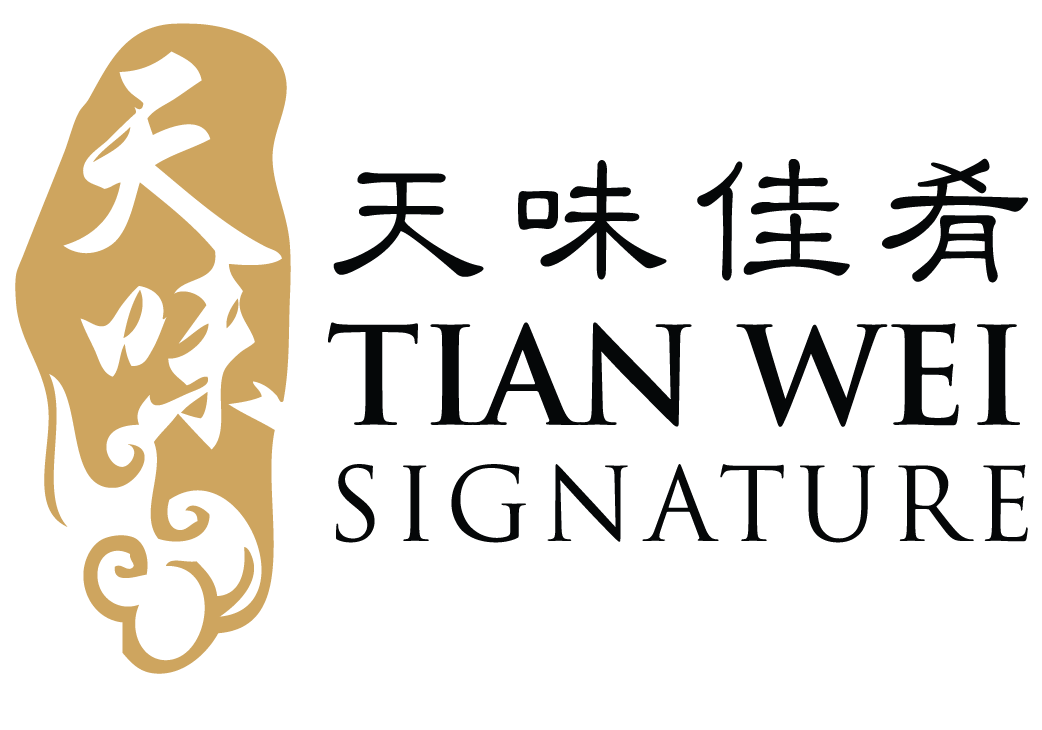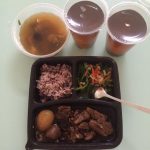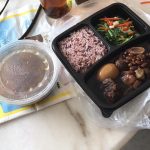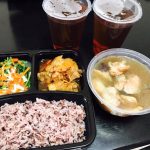81 Tagore Lane, TAG A, #01-11 Singapore 787502 ♦ Reservation : +65 6727 5599
Dietitian Answers 10 FAQs About Pregnancy Diet
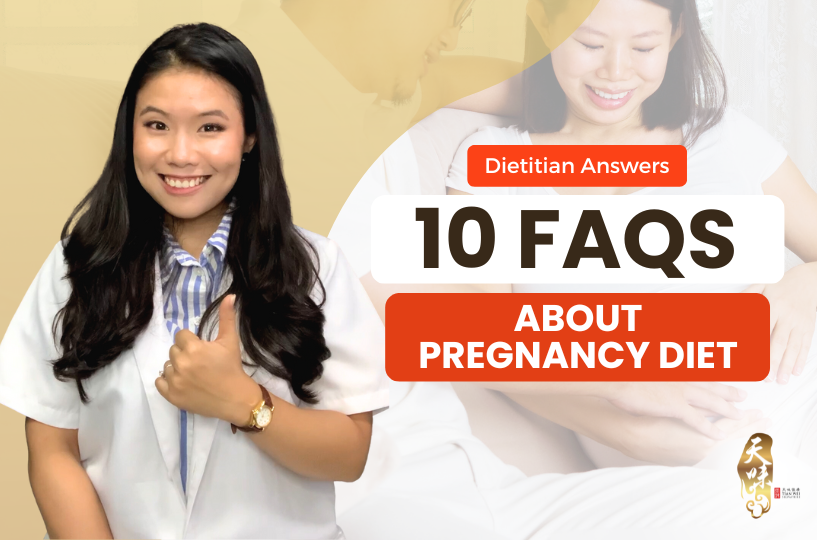
In this day and age, where information is just at the tip of our fingertips and on Google, it can be really overwhelming to tell what is right from wrong. There is just so much or too much information available, especially on “what to eat during pregnancy”. So if you are wondering if any of it is true, here are some of my answers from a Dietitian on the common nutritional questions asked by mummies.
1. If I have slightly high cholesterol, can I still take 2 eggs daily?
If you have slightly high cholesterol, 2 eggs daily may not be suitable. Even though eggs are a great source of Choline which is important for brain development in babies, it is also high in cholesterol, which may affect the cholesterol levels of those who have existing high cholesterol. Thus, you can obtain choline from other food sources such as your salmon, chicken, pork, shiitake mushroom and edamame.
2. Should I prioritise red date tea or soya milk?
If you have incorporated other calcium-rich foods adequately, such as tofu, cheese, milk, yoghurt and anchovies, into your diet, you do not have to choose one drink over the other. You can enjoy both depending on what you need for the day.
3. How important are carbs in a prenatal diet? Would a low-carb diet for diabetic mummies be safe during pregnancy and for breastfeeding?
Carbohydrates are the main source of energy during pre and postnatal. When carbohydrates are too low, mothers may have an excessive buildup of ketones which can be fatal for mother and child. However, a low carbohydrate diet planned by a Dietitian for diabetic mothers can be safe under the supervision of a Dietitian. Seek a Dietitian to discuss this further and obtain a personalised meal plan to manage your blood glucose during pregnancy through your diet.
4. What can an expectant anaemic mother eat to increase iron intake?
Iron-rich foods such as beef, pork, chicken, eggs, green leafy vegetables, and chickpeas are some great options.
There are still many other dietary practices to consider to optimize the intake and absorption of iron in mothers who are anaemic yet too sensitive to high iron oral supplementation and its side effects. Thus, it is best to undergo a full nutritional assessment from a Dietitian who would be able to provide a personalized dietary plan to fully optimize your iron intake.
5. What’s the alternative if I don’t take fish?
Omega 3-DHA are found to be only abundant in marine sources and play a role in brain development in babies. If fish is not an option, the alternatives are low mercury-containing seafood, which is still rich in Omega 3-DHA, like shrimp, squid and scallops.
6. Will ginger during pregnancy cause jaundice in babies?
No. Jaundice in babies is not caused by eating ginger or any yellow/orange-coloured foods. The yellow colour of the skin is caused by the breakdown and accumulation of bilirubin in the blood, immature development of the liver and low stool output in the infant.
Typically, Jaundice will resolve with time as the infant continues to breastfeed, increase stool output and undergo the treatment process recommended by the Doctor. There are no specific dietary restrictions for mothers as they breastfeed their infants during this time.
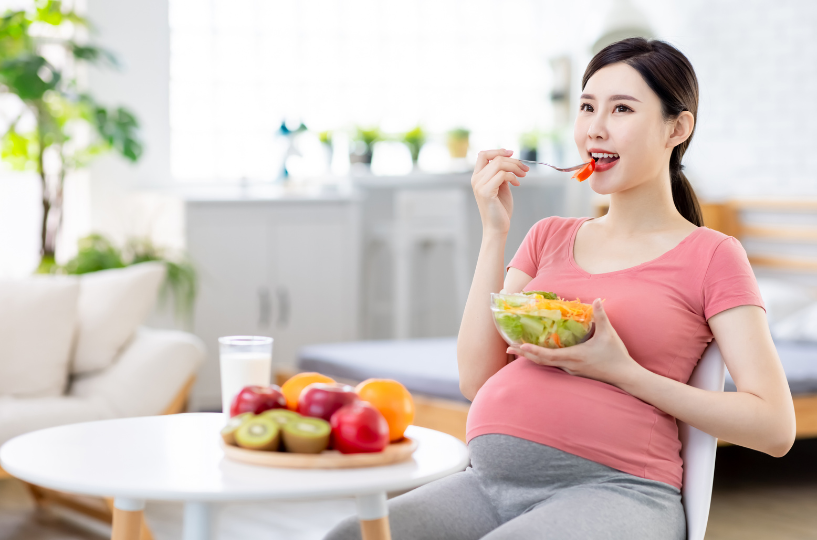
7. Is caffeine safe during pregnancy?
There is no scientific evidence that caffeine will reduce milk supply. However, excessive caffeine intake may leak into breast milk and may affect a baby’s sleep patterns, sleep quality and feeling of restlessness.
Thus, it is important to limit your caffeine intake to not more than 200mg of caffeine per day, which translates to not more than 1 cup of coffee per day or not more than 2 cups of tea per day. It is important to note that caffeine is also present in bubble teas, chocolate, soft drinks and energy drinks.
8. Can vitamin supplements help replace food intake for the required nutrients?
Supplements should not be used as a substitute for a healthy diet and lifestyle. It is there to supplement your diet when specific nutrients cannot be met via food due to certain medical conditions or needs. While supplements may help to provide additional nutrients, it is unable to cover all the different essential nutrients and bioactive compounds that are found in whole foods to support overall health and well-being.
9. Can pregnant moms eat spicy food like curry?
Due to pregnancy hormones, you may be more sensitive to spicy foods during pregnancy. You may experience heartburn more easily due to the more relaxed sphincter in your stomach, which helps to keep the food down and the growing baby which pushes against your stomach.
Nevertheless, you can still enjoy spicy food as tolerated and without any digestive issues. There is no scientific evidence that spicy food will harm the baby.
10. Can pregnant mothers eat canned tuna?
Not all canned tuna are the same. It is important to read your labels and ingredient list.
You would notice that many may not state what type of tunas are in the can. If so, avoid those canned tuna as other tuna species are higher in mercury. Exposure to foods with higher content in mercury would put your baby at higher risk of damage to the developing baby’s nervous system.
Instead, pick those that specify that the tunas in the can are Skipjack. Skipjack tuna is a good option for fish rich in Omega 3-DHA but low in mercury.
Summary
All in all, it is normal to desire the best for yourself and your baby, which is rightly so. A healthy pregnancy diet is undeniably important, as researchers have found evidence that children who obtain the right nutrition from mothers who practice good pregnancy nutrition are more likely to be born at a healthy birth weight.
Those who had good nutrition during infancy and toddlerhood were also better learners with fewer behavioural problems. Besides that, these children were also less likely to develop obesity, type 2 diabetes, heart disease and allergy later in life and in adulthood.
Optimising nutrition during pregnancy helps mummies to give the best start in life to their babies. As every mother’s nutritional needs and background are unique, it is best to seek individualised nutritional recommendations from a dietitian to optimise your and your little one’s health during this stage in life.
For a limited time only, pregnant mummies who book our 28 Days Double confinement meals are entitled to get a free 1-to-1 Prenatal Dietary Consultation with me, where I’ll take the time to understand your concerns about pregnancy diet and offer personalised solutions. So do check it out while the offer lasts!
